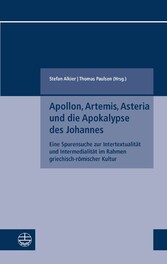Suchen und Finden
Apollon, Artemis, Asteria und die Apokalypse des Johannes - Eine Spurensuche zur Intertextualität und Intermedialität im Rahmen griechisch-römischer Kultur
Mehr zum Inhalt

Apollon, Artemis, Asteria und die Apokalypse des Johannes - Eine Spurensuche zur Intertextualität und Intermedialität im Rahmen griechisch-römischer Kultur
Der Band geht auf ein Seminar zur Poetik und Intertextualität der Johannesapokalypse zurück, das im Sommersemester 2017 am Fachbereich Evangelische Theologie der Goethe-Universität Frankfurt stattfand. Dieses interdisziplinäre Seminar, an dem sich Studierende der Theologie sowie der Klassischen Philologie gleichermaßen beteiligten, zielte auf das kulturelle Feld, in dem die Johannesapokalypse entstanden und zunächst rezipiert worden ist: das hellenistisch-römische Kleinasien. Die Aufsätze dieses Bandes zeigen intertextuelle und intermediale Verknüpfungen zu griechisch-römischer Kultur auf und dokumentieren zahlreiche Anspielungen auf griechisch-römische Gottheiten, Mythen, Herrschaftsformen und Medizin. Mit einem gemeinsamen Beitrag von Stefan Alkier und Thomas Paulsen sowie Beiträgen von Dominic Blauth, Berthold Böhm, Simon Dittmann, Tobias Gottschalk, Nadine Haas, Katrin Pellini, Yannik Schnitzspahn und Johannes Waller. [Apollo, Artemis, Asteria and the Apocalypse of John. An Investigation into Intertextuality and Intermediality within the Framework of Greco-Roman Culture] The volume originates from a seminar about poetics and intertextuality of the apocalypse of John at the Department of Protestant Theology at Goethe-University Frankfurt in summer 2017. Students of theology and classical philology participated comparably in this interdisciplinary seminar. It focused on the cultural environment of origin and first receptions of the apocalypse: on Hellenistic-Roman anatolia. The contributions in this volume indicate intertextual and intermedial connections to Greco-Roman culture and point out many references on Greco-Roman gods, myths, forms of government and medicine.
Alle Preise verstehen sich inklusive der gesetzlichen MwSt.









